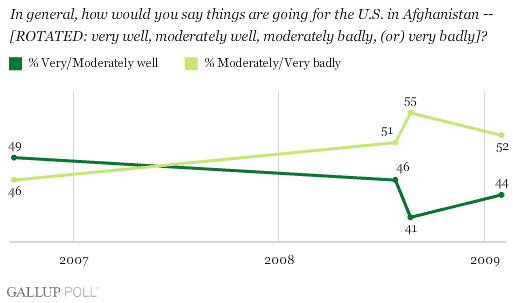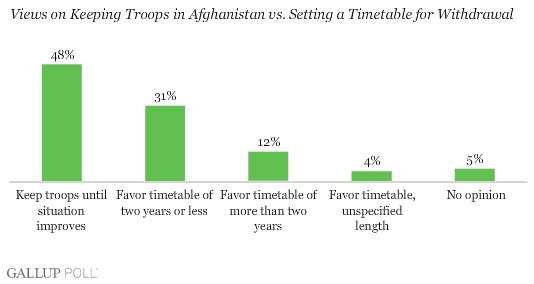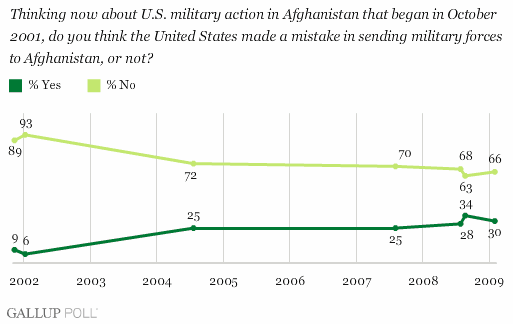WASHINGTON, D.C. -- Americans likely view President Barack Obama's decision to send more troops to Afghanistan as unfortunate but necessary. Since mid-2008, a majority of Americans have perceived things in Afghanistan to be going very or moderately badly for the United States, and 70% currently think the Taliban will retake control if U.S. forces are withdrawn.

President Obama's decision, announced on Tuesday, to send 17,000 additional troops to Afghanistan was accompanied by a White House statement stressing that urgent action was needed because "the Taliban is resurgent in Afghanistan." This assertion would appear to reflect the opinions of a majority of Americans. When surveyed about Afghanistan earlier this month, Americans overwhelmingly said they would expect Afghanistan to fall under the Taliban's control if the United States and its allies withdrew their forces. Only 21% said they did not expect the Taliban to retake control, and 9% had no opinion.
The harsh realities of the United States' continued involvement in both Afghanistan and Iraq amid a precarious economic situation at home likely weigh on many Americans. In fact, Americans are almost evenly divided about whether the United States should keep a significant number of troops in Afghanistan until the situation improves (48%) or whether it should set a timetable for withdrawal (47%). Those who support a timetable mostly favor getting troops out sooner rather than later. But at least 6 in 10 Americans either favor keeping troops in Afghanistan with no timetable, or favor a long-range timetable of more than two years.

The top U.S. commander in Afghanistan predicted this week that the United States would likely need to stay heavily committed in Afghanistan for the next three to five years. While a sizable minority of Americans would prefer a timetable for withdrawal sooner than that, the data suggest many would support a decision to stay longer.
Americans for the most part support the underlying rationale for the U.S. presence in Afghanistan. Only 30% say it was a mistake to send troops to Afghanistan, compared with 66% who disagree -- though those numbers have tightened slightly in recent years.

By comparison, since October 2006, a majority of Americans have consistently said the United States made a mistake in sending troops to Iraq.
Americans have a clear opinion as to what should be the primary goal of U.S. involvement in Afghanistan. Given a choice, a majority (54%) say it should be to weaken terrorists' ability to stage attacks against the United States rather than building a stable democratic government in that country (30%).
Bottom Line
In a Gallup Poll conducted last month, 68% of Americans said they expected Obama to increase military strength in Afghanistan, and 43% considered this very important. Thus, Americans are likely not surprised by the decision to increase U.S. troop strength in that country, something Obama promised to do throughout the 2008 presidential campaign. Importantly, Americans still support the basic decision to send U.S. troops there, something that has not been the case for the Iraq war for quite some time, and fear rather severe consequences (re-established Taliban control) if the United States abandons its mission.
Survey Methods
Results are based on telephone interviews with 1,027 national adults, aged 18 and older, conducted Jan. 30-Feb. 1, 2009. For results based on the total sample of national adults, one can say with 95% confidence that the maximum margin of sampling error is ±3 percentage points.
Interviews are conducted with respondents on land-line telephones (for respondents with a land-line telephone) and cellular phones (for respondents who are cell-phone only).
In addition to sampling error, question wording and practical difficulties in conducting surveys can introduce error or bias into the findings of public opinion polls.
